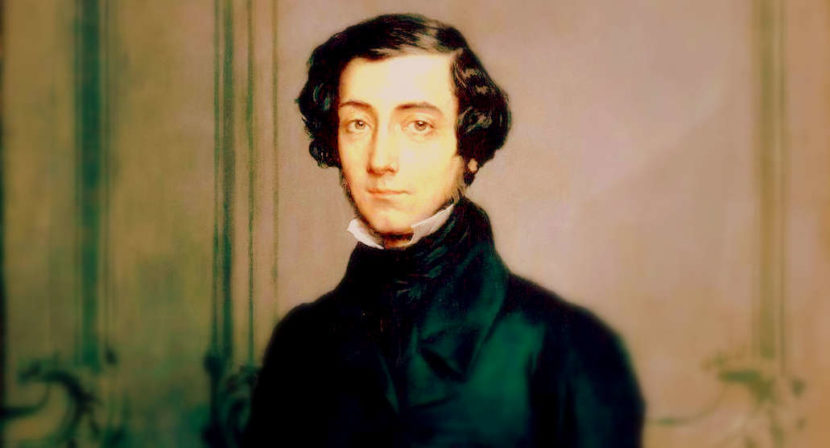A fellow writer, who actually understood what America and revolutions are all about, and whom I have quoted in my books is Alexis de Tocqueville, the French historian who wrote The Old Regime and the Revolution about the French revolution that started in 1789. Tocqueville wrote his book in 1856, six decades after the French revolution. More than 150 years later, China’s communist leaders are trying to make sense of his observations.
Tocqueville analyzes the causes of the French revolution by examining social conditions under the “old regime”. He wrote that when the revolution erupted, the “old regime” of Louis XVI was at its most prosperous, but that prosperity had fueled social disparity, leading to the revolution. He offered an explanation as to why prosperity did not prevent a major revolution but, on the contrary, fomented one – a point China’s new leadership is taking to heart as it tries to re-instill Maoist-type party discipline and loyalty.
Although China is the second-largest economy in the world, with its people enjoying unprecedented wealth, polarization has also reached an all-time high. Its Gini coefficient, which measures income disparities, is 0.61 – way above the internationally recognized danger threshold of 0.4. On the scale, 0 means perfect equality and 1 maximum inequality.
Tocqueville also believed that not all the revolution’s legacies were positive, even though it overthrew the old regime and took France into a new era of equality and democracy. After overthrowing the autocratic monarchy by violent means, social ills reappeared after undergoing a temporary makeover. It looks and sounds familiar in Egypt, Tunisia, Libya and even Syria.
China’s leaders are afraid that a revolution – the price to pay for modernization – is looming in the world’s last major communist-ruled nation.
The factors that contributed to the French revolution and the waves of revolution that are ricocheting through North Africa and the Middle East can be seen in today’s China. These include widespread discontent caused by despotism, corruption, social inequality, social injustice, unemployment and inflation, along with the rise of the middle class. Public protests in China, officially described as “mass incidents”, now exceed more than 100,000 a year. What Tocqueville saw in France two centuries ago has an almost exact replica in today’s China – a fact that China’s new leadership is trying to address.
Revolutions do not generally occur during a time of poverty. They take place when economic development has brought about acute polarization. At such times, conflict between social classes is easily incited, with those at the bottom of society turning their anger into the flames of war.
Another of Tocqueville’s conclusions was that a regime with centralized power actually intensified tensions between social classes. The French political system had placed executive, legislative and judicial powers under centralized authority before the old regime was toppled.
Today’s China, with its system of one-party rule, is seen by some as the modern-day equivalent. Many academics say the party’s monopoly on power is the chief reason behind China’s widening wealth gap, rampant corruption and abuse of power by officials – all major sources of public dissatisfaction with the government.
But the most discomforting of Tocqueville’s conclusions for China’s leaders is that the “most dangerous moment for a bad government is when it begins to reform.”
“It is almost never when a state of things is the most detestable that it is smashed, but when it beginning to improve, it permits men to breathe, to reflect, to communicate their thoughts with each other, and to gauge by what they already have the extent of their rights and their grievances. The weight, although less heavy, seems then all the more unbearable,” Tocqueville wrote.
This advice that reform could be just as dangerous as the status quo, if not more so, presents the Communist leadership with a dilemna wrapped in a conundrum, otherwise known as a cluster fuck, given the party’s long-held belief that as long as it could bring prosperity to the people it could maintain its hold on power.
That political conundrum has also been summed up in a famous statement by the late Kuomintang leader Chiang Kai-shek when he responded to his reformist son Chiang Ching-kuo’s request that he overhaul the then-corrupt ruling party during the civil war. “If we reform the Kuomintang, the party will perish; if we don’t, the state will perish,” the father replied.
The reality today is that China is not alone on the long and winding revolutionary road. America and its Tea Party and Occupy Wall Street movements ignited the revolutionary fires that were smoldering across the country for the same reasons people in China, Russia, India and the rest of our interlocal world are resentful and angry. Even though millions have been lifted out of poverty and a sizeable global middle class created as a result, inequality in many of its dimensions appears to have worsened rather than eased. A dramatic concentration of incomes and wealth is on display in every part of the globe – from America to China – and across the rest of the revolutionary world.

